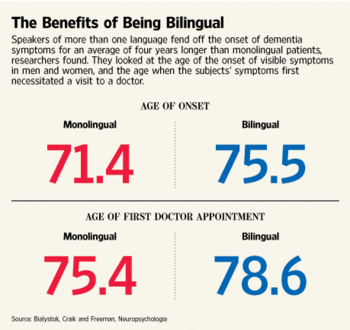Source of graph: online version of the WSJ article quoted and cited below.
At first glance the graph and the text quoted below seem inconsistent on whether bilingualism delays the onset of dementia. The text says no, the graph says yes. On closer reading, the text is referring to the “physical signs of deterioration” while the graph is referring to “visible symptoms.”
(p. D1) A lifetime of speaking two or more languages appears to pay off in old age, with recent research showing the symptoms of dementia can be delayed by an average of four years in bilingual people.
Multilingualism doesn’t delay the onset of dementia–the brains of people who speak multiple languages still show physical signs of deterioration–but the process of speaking two or more languages appears to enable people to develop skills to better cope with the early symptoms of memory-robbing diseases, including Alzheimer’s.
Scientists for years studied children and found that fluently speaking more than one language takes a lot of mental work. Compared with people who speak only one language, bilingual children and young adults have slightly smaller vocabularies and are slower performing certain verbal tasks, such as naming lists of animals or fruits.
But over time, regularly speaking more than one language appears to strengthen skills that boost the brain’s so-called cognitive reserve, a capacity to work even when stressed or damaged. This build-up of cognitive reserve appears to help bilingual people as they age.
For the full story, see:
SHIRLEY S. WANG. “Building a More Resilient Brain.” The Wall Street Journal (Tues., OCTOBER 12, 2010): D1 & D2.

